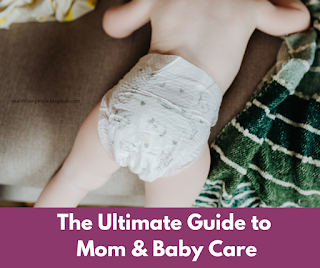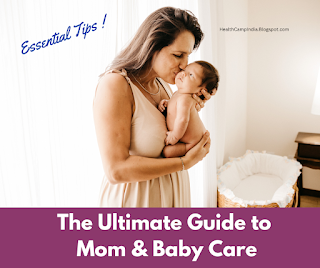This post is for you to provide some key guidance on essential areas of mom and baby care during the first few months. I am confident this will make you more prepared and confident
Establishing a Soothing Baby Bath Routine
Bath time is a wonderful opportunity for bonding and creating routines with your baby. Here are some tips for bathing your baby safely and enjoyably during the first year:
Setting - Have everything ready beforehand. Gather bath supplies in one place and prep the room to be warm and draft-free. It's ideal to bathe babies in a small plastic tub on a non-slip surface until they can sit up.
Water - The water should be lukewarm, not hot. Check with your elbow before putting baby in. Fill only 2-3 inches of water for newborns.
Soap - Use a gentle baby wash or soap without fragrance or chemicals. Avoid getting in eyes by always wiping face with a wet cloth.
Hair - Gently massage in baby shampoo and rinse thoroughly. Support head while pouring water.
Safety - Never leave baby alone during baths. Keep one hand on them at all times. Lay a towel in tub for traction.
Routine - Set a calming mood with soft music or singing. Do baths daily or every 2-3 days max.
Diapering your baby will become second nature with time. Stock up on these essentials to make diaper changes faster and mess-free:
Diapers - Stock newborn and size 1 diapers for the first months. Have about 3-4 day's worth.
Wipes - Fragrance-free wipes help prevent rashes. Have refill packs handy.
Diaper cream - Use with each change to prevent and heal rashes. Zinc oxide creams work best.
Changing pad - Have a portable pad for different rooms and travel. Stock extra covers.
Diaper pail/bags - Use bags that contain odors and masks smells. Take out trash frequently.
Hand sanitizer - Keep near changing area to disinfect hands after diapering.
Changing table - Use safety straps and never leave baby unattended. A waterproof mat helps.
Burp cloths - Place under baby to catch messes during changes. Can also use cloth diapers.
Some helpful tips:
- Change diapers every 2-3 hours, or whenever soiled or wet.
- Gently clean bottom and apply cream with each change.
- Dispose diapers properly and wash hands well after changes.
- Let baby go diaper-free for a bit daily for fresh air.
- Use cloth diapers? Prep and launder them properly for hygiene.
- Soothing and Bonding Through Feeding Time
Feeding time with your baby should be a relaxed and comforting experience for both of you. Follow these tips:
If breastfeeding:
- Find a comfortable position. Use pillows to support your arms and back.
- Ensure proper latch by bringing baby to breast, not the other way.
- Nurse on demand, whenever baby shows hunger signs. Expect 8-12 feeds per day.
- Pump and store breastmilk to allow mom to rest. Thaw and warm for bottle feeds.
- Drink plenty of fluids and eat well to keep up calorie needs for nursing.
If formula feeding:
- Choose a standard cow's milk or soy-based formula to start.
- Sterilize bottles and nipples before first use. Wash well before each feed.
- Make formula according to instructions. Test temperature before feeding.
- Burp baby every few oz to prevent gas. Pace feeds rather than rush.
- Throw out unfinished formula after feed. Do not save for later to prevent bacteria growth.
Essential tips:
- Hold baby close, make eye contact, and talk/sing during feeds.
- Respect baby's fullness cues and don't force overfeed.
- Gently wipe and burp baby after feeding.
- Introduce pumped breastmilk or formula gradually when supplementing.
- Calming a Crying Baby
It's normal for babies to cry and fuss often. Here are tips to calm your baby:
- Check for basic needs - Hungry? Wet or soiled diaper? Overtired? Overstimulated?
- Hold/wear your baby close. Gentle rocking and swaying motions are soothing.
- Soft shushing sounds and white noise help drown out overstimulation.
- Swaddling provides a sense of security. Some babies enjoy pacifiers too.
- Infant massage relaxes muscles. Apply gentle but firm stroking motions.
- Take baby for walks in a carrier or stroller. Motion and new sights can distract them.
- Play soft music, sing lullabies, or run appliances for their rhythmic sounds.
- Keep the environment calm and low-lit. Turn off screens and loud noise.
If inconsolable crying persists, call your pediatrician to rule out illness. Don't be afraid to put baby down in a safe space for a few moments to recenter yourself - take deep breaths, drink water, and call a friend or partner for support.
Helpful Sleep Tips for Baby (and You!)
The first weeks and months with a new baby can be tiring. Here are tips to help your baby (and you) get better quality sleep:
- Follow the eat-wake-sleep cycle. Feed baby before naps/bedtime.
- Establish a calming pre-sleep routine like a bath, swaddle, story.
- Put baby down drowsy but awake so they learn to self-soothe.
- Use white noise to drown out disruptive household sounds.
- Optimize the space - cool, very dark room with a snug-fitting crib sheet.
- Avoid stimulation and playtime before bed.
These tips for you as a Mom
Sleep when baby sleeps, even if just power naps. Ask others to help.
Take turns with your partner being "on duty" so each gets unbroken sleep.
Nap together by safely co-sleeping. Research shows this allows more total sleep.
Lower nighttime interruptions by filling your water bottle, prepping feeds, etc.
Shift schedule so your partner handles late feeds and you get early morning rest.
Prioritize rest, take it easy with chores, and accept help from loved ones in the early months. Sleep patterns will regulate as your baby grows. Contact your doctor if experiencing extreme sleep deprivation.
Additional Essentials for Newborn Care and Comfort
Besides feeding, bathing, diapering and sleep, some other newborn care basics include:
Proper temperature: Use light breathable clothing. Avoid overheating or chilling.
Health tracking: Monitor wet diapers, weight gain, body temperature. Call doctor about any concerns.
Healthy development: Provide tummy time. Read, talk and sing to stimulate speech and senses.
Nail care: Use baby nail clippers or emery board to trim nails. File smooth to prevent scratching.
Laundry: Wash clothes, sheets, cloths often in a gentle, dye/fragrance free detergent.
Safety proofing: Cover outlets, secure heavy furniture, install cabinet locks. Never leave baby unattended.
Medical kit: Have rectal thermometer, nasal aspirator, medications, extra formula etc. handy.
Skin care: Apply healing ointment to dry patches. Gently wash and lotion skin daily.
Travel: Be prepared with enough supplies, familiar items like blankets, extra changes of clothes when on the go.
Please remember, at the end of the day, have faith in yourself as a parent.
When in doubt, ask for help from your doctor or loved ones. Keep in mind that there are no perfect parents - we all make mistakes.
Over time, you will become more assured in taking care of your little one. Make sure to treasure every precious moment with your baby, because they grow up so fast!
Thanks for reading, see you in next post.....until then....Happy Parenting !!




.png)

.png)
No comments:
Post a Comment